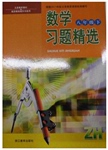题目内容
完形填空
It was 1952 and my father was away at war, leaving my mother and me behind to face hardship alone. I was ten. My mother was a _________ and worked at the local clinic a few blocks from where we lived.
The bell rang and _________ of Christmas were the only thing on my mind. I raced home. The apartment was empty and a note was _________ to the refrigerator. My mother was working a double shift and _________ me instructions for the day. We had planned on making Christmas biscuits _________, but my mother_________ it.
I carefully _________through mother’s closet, finding most of the _________for Christmas wrapped in linen cloth, all but one toy, a model airplane. I was still _________ at my mother and I threw the airplane onto the floor, breaking one of its wings. I stood_________. How was I going to explain this? Then I heard my mother coming through the door. I _________ to my room.
After telling my mother the horrible _________ , I did not hear my mother _________ me. She just told me to follow her. Climbing the steps without catching our _________ , we entered the clinic. There in a bed was a boy who looked very sick.
“He is going to die, Danny,” my mother told me, “_________today, maybe tomorrow. He loves planes. I knew his mother could not _________ to buy him one. So I did. I count my blessings every night and think of this boy and how _________ I am that you are not in that bed.”
The _________ cut hard and sharp in my heart. The tears _________ down my face and I was so guilty. I ran home as fast as I could and into my room where I_________ myself to sleep.
1.A. saleswoman B. surgeon C. teacher D. clerk
2.A. thoughts B. memories C. desires D. hopes
3.A. written B. found C. attached D. sent
4.A. reminded B. provided C. saved D. left
5.A. alone B. soon C. together D. immediately
6.A. ruined B. refused C. forgot D. challenged
7.A. walked B. hunted C. broke D. got
8.A. toys B. gifts C. clothes D. supplies
9.A. anxious B. pleased C. mad D. eager
10.A. awake B. happy C. wild D. frozen
11.A. raced B. removed C. struggled D. wandered
12.A. note B. idea C. truth D. message
13.A. quarrel with B. shout at C. worry about D. cheer up
14.A. calmness B. sweat C. rest D. breath
15.A. Possibly B. Certainly C. Properly D. Regularly
16.A. encourage B. persuade C. afford D. force
17.A. wonderful B. grateful C. hopeful D. helpful
18.A. scolds B. comments C. phrases D. words
19.A. floated B. dropped C. slowed D. rolled
20.A. cried B. made C. turned D. moved
 习题精选系列答案
习题精选系列答案
